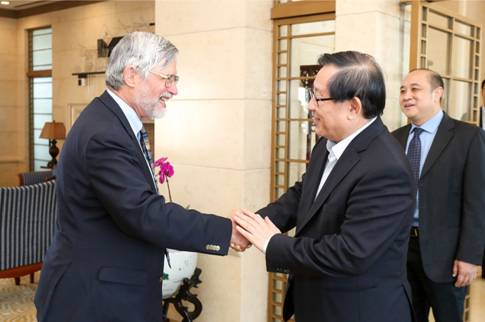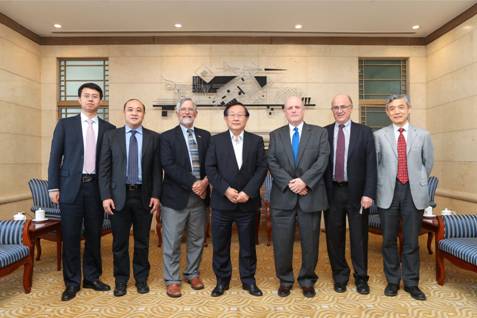Wan Gang meets with former US president advisor
Wan Gang met with professor John Holdren in Beijing on June 3, 2019.
CAST president Wan Gang (R, 2) meets with professor John Holdren (L,1), presidential science advisor and director of the White House Office of Science and Technology Policy during the Obama administration, in Beijing on June 3, 2019.
CAST high-ranking officials pose for a group photo with former US president advisor delegation in Beijing on June 3, 2019.
Wan Gang, president of the China Association for Science and Technology (CAST), met with professor John Holdren, presidential science advisor and director of the White House Office of Science and Technology Policy during the Obama administration, in Beijing on June 3, 2019.
The two sides held discussions on advancing exchanges and cooperation between Chinese and U.S. science communities in present situation as well as energy development and climate change issues.
Wan extended warm welcome to Holdren and his delegation.
Looking back at the history of bilateral dialogues on science innovation and the friendship between the two countries' science communities, Wan stressed the dialogues have laid a good foundation for science cooperation.
However, Wan pointed out, the current U.S. unilateral tendency has become a barrier for implementing the outcomes of bilateral dialogues in an in-depth manner.
Speaking of the June 2 statement by ten CAST-affiliated societies on IEEE's "editorial restriction" incident, Wan said IEEE's gratuitous restriction on employees of Huawei and its affiliates is a provocation challenging academic independence, the scientific spirit as well as free and equal academic exchanges among scientific researchers.
He hoped Holdren can help get the message across in the U.S. that the two countries' science communities should act independently in academic exchanges and equal dialogue, which are all guaranteed by relevant bilateral agreements and the Constitutions of both China and the U.S.
Wan called on the science communities of the two countries to strengthen exchanges and cooperation despite all difficulties and jointly make contributions to the advancement of human civilization.
Wan also told Holdren the Chinese government firmly upholds the concept of green development, an agenda which is of great significance and involves population growth and cultural construction. In the sector of electrically powered vehicles, the concept of green development had become reality in buses, taxis and online hailed cars of China's southern metropolitan Shenzhen.
Wan hoped China and the U.S. will seek opportunities for science cooperation, exchanges and dialogue on green development and strengthen a mechanism for people-to-people dialogue.
He invited Holdren to attend the World New Energy Vehicle Congress which will be held in Boao, Hainan province this July.
Holdren thanked CAST for its warm reception and gave an introduction about the progress in energy and green "Belt and Road" cooperation.
Also recognizing the importance of people-to-people dialogue, Holdren promised to continue academic exchanges with the Chinese science communities to get ready for future cooperation.
Professors Henry Lee and Daniel Schrag of Harvard University, who were with Holdren at the meeting, also held the two countries' science communities should have a clear stance and conduct direct dialogues and that the China-U.S. relationship should not be one vying for leadership but one jointly pushing for dialogue on the world's major concerns.
Also joining the meeting were Liu Yang, director-general of the CAST Department of International Affairs, and Xue Lan, professor of Tsinghua University and dean of the university's Schwarzman College.
Tag: International affairs

